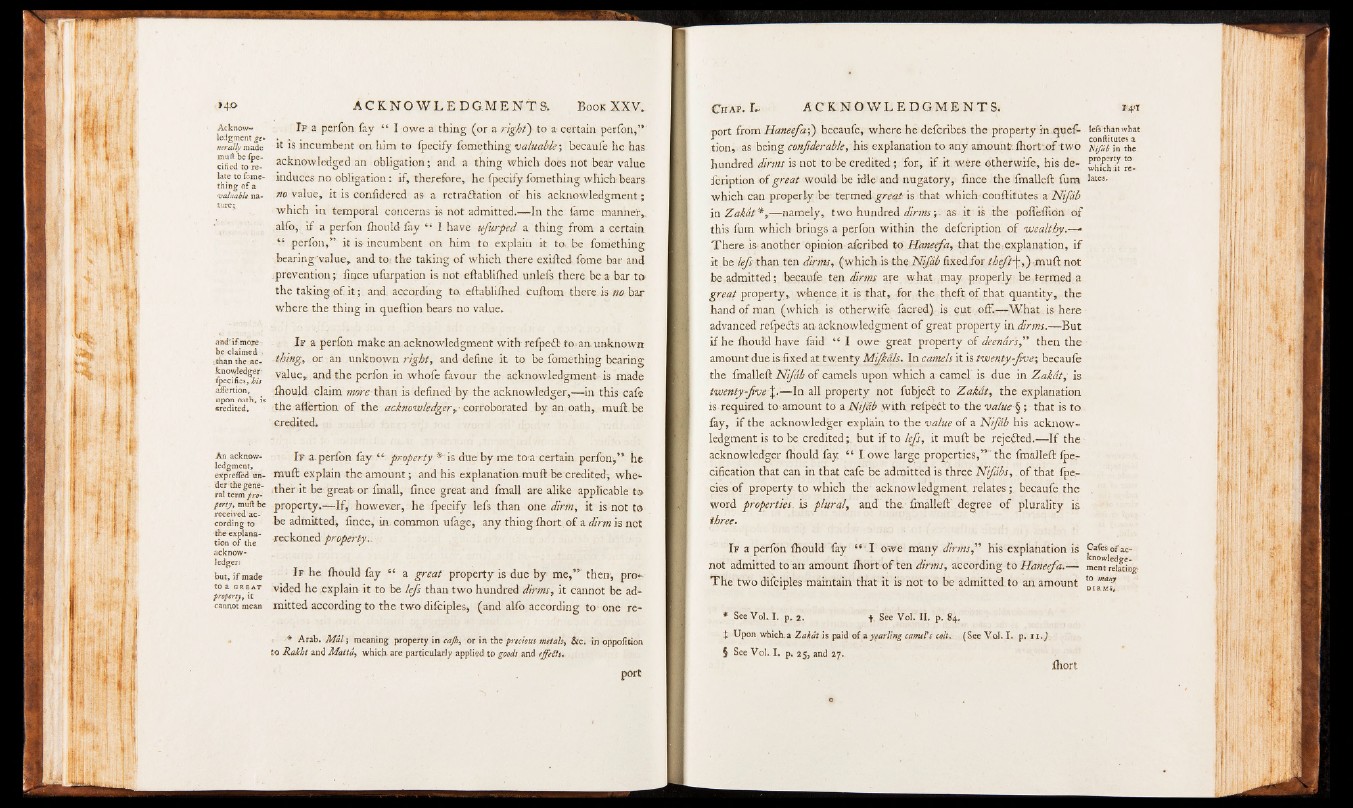
Acknowledgment
ge*
nerally made
mud be fpe-
cified to relate
to fome-
thing o f a
fvaluable nature
$.
and'if more
be claimed ■
: than the acknowledger
fpecifies, his
aiTertion,
upon oath, is
credited.
B o o k X X V ,
If a perfon. fey “ I owe a thing (or a right) to a certain perlon,” '
it is incumbent on him te fpecify fomething valuable; becaufe he has
acknowledged an obligation; and a thing which does not bear value
induces no obligation: if, therefore, he fpecify fomething which’bears
no value, it is conlidered as a retractation of his acknowledgment;
which in temporal concerns is not admitted.—In the feme manner,,
alfo, if a perfon fhould fey “ I have ufurped a thing from a certain
“ perfon,” it is-incumbent on him to explain it to. be fomething
bearing- value, and to: the taking of which there exifted. fome bar and
.prevention; fince ufurpation is not eftablifhed unlefs there be a bar to
the taking of i t ; and. according to eftablifhed cuftona there is no bar
where the thing in queftion bears no value..
If a perfon make an acknowledgment with refpeCt to< an unknown
thing, or an unknown right, and define it to be fomething bearing
value, and the perfon in whofe favour the acknowledgment is made
fhould claim more than is defined by the acknowledger,—in this cafe
the aflertion of the acknowledger r corroborated by an oath, muft be
credited.
An acknowledgment,
exprefled under
the general
term property,
muft be
received according
to
-the-explanation
o f the
acknowledger:
but, i f made
to a GREAT
property, it
cannot mean
If a. perfon fey f&. property is due by me toa certain perfon,” he
muft explain the amount; and his explanation muft be credited; whe*
ther it be. great or fmall, fince great and fmall are alike applicable to
property.—If, however, he fpecify lefs than one dirm, it is not to
be admitted, fince, in. common ufege, any thing fhort of a dirm is not
reckoned property..
If he fhould fey “ a great property is due by me,”‘ then, pro*
vided he explain it to be lefs than two hundred dirms, it cannot be ad*
mitted according to the two difciples, (and alfo according to-one re-
* Arab. A la ! ; meaning property in caflij or in the pre:::m inti ah, & c . in oppofition
to R a ih t and M a tte , which, are particularly applied to goods and effects.
port
port from Haneefai) becaufe, where he deferibes the property in.queftion,
as being confiderable, his explanation to any amount, fhortcof two
hundred dirms is not to be credited; for, if it were otherwife, his de-
fcription of great would be idle and nugatory,, fince the finalleft fum
which can properly be- termed great, is that which conftitutes a Nifdb
in Zakdt*,— namely, two hundred dirms', as it is the pofieflibn of
this fum which brings a perfon within the defeription of wealthy.—
There is-another opinion aferibed to H'aneefa, that the explanation, if
it be lefs than ten dirms, (which is the-Nifab fixedfor tb e ftff) m uli not
be admitted; becaufe ten dirms are what ,may properly be termed a
great property, whence it is that, for the theft of that quantity,. the
hand of man (which is otherwife fecred) is cut off.-—What , is here
advanced refpects an acknowledgment of great property in dirms.-—But
if he fhould have feid: “ 1 owe great property of deendrs,” then the
amount due is fixed at twenty Mijkdls.. In camels it is twenty-five; becaufe
the fmalleft Nifdb of camels upon which a camel is due in Zakdt, is
twenty-five \.— In all property not fubjedt to Zakdt, the explanation,
is required to. amount to a Nifdb with refpett to the value § ; that is to
fay, if the acknowledger explain to the value of a Nifab his acknowledgment
is to be. credited;. but if to lefs, it muft be rejected.— If the
acknowledger fhould fey “ I owe large properties,” the fmalleft iper
cification that can in that cafe be admitted is three Nifdbs, o f that fpe-
cies of property to which the acknowledgment, relates;. becaufe the
word properties is plural, and the. fmalleft degree of plurality is
three.
If a perfon fhould fey “ • I owe many dirms," his explanation is
not admitted to an amount fhort of ten dirms, according to Haneefa.—
The two difciples maintain that it is not to be admitted to an amount
* See V o l. I . p . 2. + See Vol.' I I . p. 84.
. Upon which a 7_.akut is paid o f ^yearling camel*• ceil. (See V o l. J . p. s i . )
§ See V o l. I . p. 25, and 27.
lefs-thanwhat
conftitutes a
Hifdb \n the
property to
which it relates.
.
Cafes o f acknowledge
tnent relating-
to many
DIRMS,.
fhort